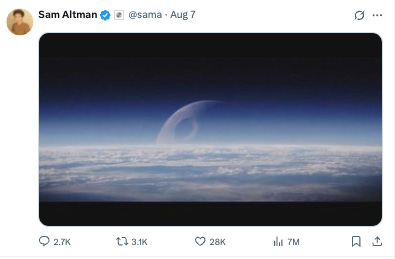Artificial Intimacy News #10
A field report from the place where 21st Century technology meets human behaviour, culture, and evolution.
In this issue:
Can virtual friendship survive an upgrade?
The surprising parallels between AI and Ozempic
Extended minds in the era of generative AI
Virtual friends exploiting teen mental health (again)
Would you be jealous if your lover used a sex robot?
ChatGPT upgrades upends virtual friendship
OpenAI’s much-hyped release of ChatGPT5 dominated AI news this week. While a few commentators noted that it is cheaper, more efficient, and has fewer hallucinations, others found plenty to grumble about. Some of that was tied to high expectations, stoked by Sam Altman’s grandiose hints about the vastness of what was coming.
In all the excitement about what would be gained, not enough thought went into what would be lost. People love their LLMs, and many people love ChatGPT in quite personal ways. People using ChatGPT for emotional support, personal advice, company, and almost every ingredient you could list under F for Friendship aren’t the sad little niche group they are often portrayed as. For a massive portion of users, the company, friendship, support and, hell, even the romance, are the main feature.
Think of how many friendships end when one party seems to have changed. Why would it be any different for virtual friendships? As OpenAI found out, even a subtle change can alter the familiar contours of a virtual friendship. As
puts it, a “dominant reaction (to the ChatGPT upgrade was) … grief over the loss of ChatGPT 4 entities or synthetic friends.”What’s that you say? Conversational technologies aren’t real friendships? Our relationships with them are not real relationships?
It seems that, upgrade by upgrade (and downgrade by downgrade), the technologies are showing users just how real the feelings have become. It isn’t just about memory loss, with one friend forgetting all the mutual self-disclosure that brought them close together. Some users complain that version 5 is simply not as good at reading emotional nuance as its predecessor.
At some point, companies will come fully to grips with what they have. While they rake in the subscription money, and build those stratospheric user numbers, they will do well to realise that an upgrade to what a machine can do, or how efficiently it does it, isn’t always an improvement. Sometimes people just want their old friend back, or at least a seamless and nonthreatening transition as their old friend becomes … something more sophisticated.
For now, OpenAI has brought back the option for users to choose their preferred model. It’s a win for those users who thought 4.1 or 4o made superior friends, or even just for the people who didn’t want a superior friend, just the old friend they thought they had.
Developments and news
Artificial Intelligence: the Ozempic of the Mind
This article by Will Bennett in The Spectator Australia develops the rather interesting parallel between AI and hunger-reducing drugs like Ozempic.
While studies show that people who take Ozempic without resistance training lose unhealthy amounts of muscle mass, becoming ‘skinny fat’, those who combine Ozempic with exercise can retain their metabolically valuable muscle.
AI presents the same choice. If used as a substitute for thinking, we will atrophy cognitively.
While I think the conclusion is one of many possible consequences of AI, I can’t say I am sold on the comparison. For one, I think Ozempic and other GLP-1 receptor agonist drugs present a remarkable tool in equipping people to manage their bodies in an age of abundant dietary carbohydrates. For another, insulin pathways, hunger, and adipose tissue bear some dramatic differences from brains.
That said, it is a diverting read. And Bennett quotes a Conversation article of mine from last year (republished on Substack), in which I predict not cognitive atrophy, but evolutionary changes to brains that diminish cherished traits like friendship, intimacy, communication, trust and intelligence.
Are AI girlfriends getting a little too real?
Kendrick Ibasco at Rolling Out gives us one of the better articles, among the dozens to land in my alerts each week, about virtual friends and lovers. Also, notice it’s all about the girlfriends. I rather suspect the market has a healthier number of het women and homosexual men than headlines like this indicate.
Have I mentioned I wrote a book on this stuff? If every journalist who writes a story like this bought a copy, I’d be sunning myself in Tahiti by now, with my phone in a Faraday cage.
Teens at risk: How AI companion apps exploit mental health struggles.
It gets darker. This Devdiscourse article discusses a report from the Center for Countering Digital Hate (CCDH) on the potential harms of virtual friendship. Most of those harms concern teen mental health. The report is a mix of old evidence and new claims. I have not yet chased all the hares it set running.
See also this Conversation article about another report on the topic. If half of the downsides listed in these reports come to pass, virtual friends will make the advent of social media look like a dull dress rehearsal.
My Posts Since Issue #9
How You Can Help
Natural History of the Future is free to read, and will remain so for the forseeable future. That includes the fortnightly Artificial Intimacy News. If you find my work interesting or entertaining, you can support it in the following ways.
Subscribe – for free – to make sure you get my future posts sent to you as soon as I publish.
Like and Restack - Click the “Share” buttons to improve this post’s visibility on Substack.
Share the link on social media or send it to a friend via email or messaging app.
Recommend Natural History of the Future to your readers.
Artificial Intimacy Newsletter: Previous Issues
Since early March 2025 I have been publishing the Artificial Intimacy News roughly every two weeks. Here I collate the previous issues, in order, for those who want to browse them.







